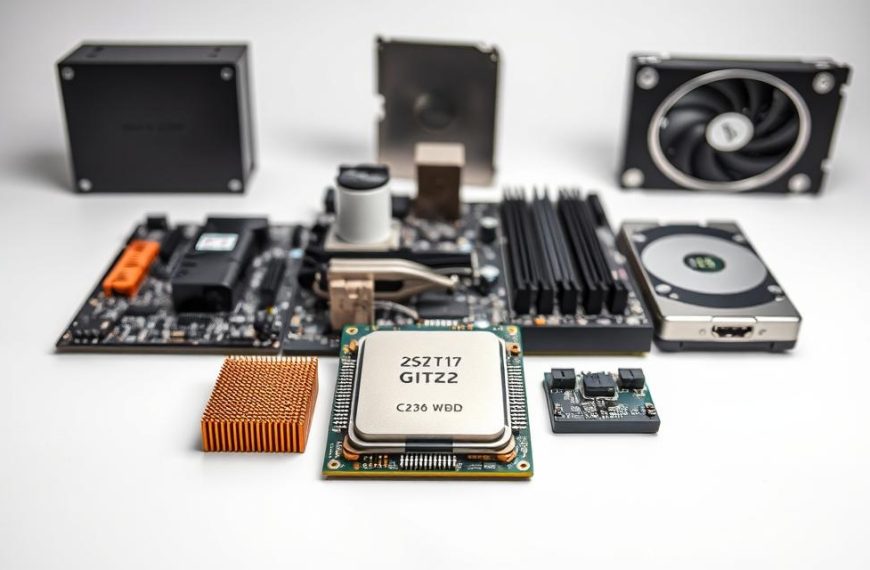Computer hardware engineers drive innovation in the UK’s evolving technology landscape. Their role is crucial in shaping the future of computing. This guide explores the salary trends for these technical experts in the UK.
These professionals design, develop, and test computer systems and components. Their average base salary is about £60,000 per year. The salary range spans from £44,000 to £73,000, offering growth potential1.
Career progression greatly affects earnings in this field. Early career professionals earn around £50,000 on average. Mid-career engineers see a 17% increase, reaching about £70,0001.
Additional compensation exists through bonuses ranging from £0 to £10,000. The UK market offers total pay packages between £41,000 and £92,0001.
This guide provides key insights into the current compensation landscape. It aims to help professionals make informed decisions in the fast-paced technology sector.
Understanding the Fundamentals of Hardware Engineering Careers
Hardware engineering is a dynamic field in technology. It offers exciting chances to shape the digital world. Students and aspiring engineers will find this career path challenging and rewarding.
Essential Qualifications and Skills Required
Hardware engineering typically requires specific educational credentials. Most professionals enter with a bachelor’s degree in computer science or electrical engineering2.
The educational pathway includes:
- Bachelor’s degree (69.3% of engineers)2
- Master’s degree (17% of professionals)2
- Specialised certifications
Certification options for hardware engineers include2:
- Engineer in Training Certification
- IEEE Professional Software Engineering Master Certification
- Certified LabView Developer
Core Responsibilities in Hardware Engineering
Hardware engineers design, develop, and test computer systems and components. They create physical computing infrastructure and ensure technological performance. Their role also involves innovating new hardware solutions.
| Job Title | Primary Responsibilities |
|---|---|
| Hardware Design Engineer | Circuit design and component integration |
| Server Hardware Engineer | Network infrastructure development |
| Design Verification Engineer | Testing and quality assurance of hardware systems |
Industry Overview and Market Demand
The hardware engineering sector shows promising growth prospects. Job growth is projected at 5-7% over the next decade32. The field offers substantial opportunities with about 4,600-5,000 job openings annually32.
Hardware engineering continues to be a critical component of technological advancement, driving innovation across multiple industries.
What is the Salary of a Computer Hardware Engineer
The computer hardware engineer salary in the UK varies widely. Factors like experience, specialisation, and location greatly influence pay4.
Fresh graduates can expect to earn between £35,000 and £45,000 yearly. As skills improve, salaries grow substantially5.
- Starting salary: £35,000 – £45,000
- Mid-career salary: £45,000 – £65,000
- Experienced engineers: £75,000 – £100,000
Several key factors affect salary growth:
- Technical expertise
- Industry sector
- Company size
- Individual performance
Advanced certifications can boost earning potential significantly. Specialised skills also play a crucial role in increasing salaries6.
Regional Salary Variations Across the United Kingdom
UK regional salary differences are vital for hardware engineers seeking the best career opportunities. Salaries vary across cities and regions, reflecting local economic conditions and tech industry concentrations7.
These variations mirror the unique landscape of each area’s hardware engineering sector. Understanding these differences can help engineers make informed career choices.
Top-Paying Cities for Hardware Engineers
London leads as the highest-paying city for hardware engineers. Professionals here earn substantially above the national average7.
London-based hardware engineers can expect earnings 6.9% higher than the national benchmark7. This premium reflects the city’s status as a tech hub.
- London: Top-tier salaries with 6.9% premium7
- Cambridge: Strong tech ecosystem with competitive compensation
- Brighton and Hove: Marginal 0.1% above national average7
Salary Differences by Geographic Location
Regional variations reveal interesting salary patterns across the UK. While London leads, other cities show different compensation trends7:
- Manchester: 5.2% below national average7
- Liverpool: 5.5% below national average7
- Birmingham: 5.2% below national average7
- Leicester: 6.2% below national average7
Cost of Living Adjustments
Hardware engineers must consider cost of living when evaluating regional salaries. A higher London salary might be offset by increased living expenses8.
The average annual salary for a computer hardware engineer in England is £114,600. This figure varies based on location and experience8.
Professionals should carefully analyse both salary potential and living costs when making career decisions. This approach ensures a balanced view of each opportunity.
Experience and Specialisation Impact on Earnings
Hardware engineer career progression significantly affects potential earnings. Specialised roles can boost income potential9. The salary trajectory shows remarkable growth from entry-level to advanced positions with substantial financial benefits.
Entry-level hardware engineers start with competitive salaries. These salaries increase rapidly with experience. The average salary progression reveals impressive financial growth:
- Entry-level salary: £78,440
- Mid-career salary: £99,790
- Experienced engineers (10+ years): £118,7409
Specialisation is crucial for maximising earning potential. Niche skills in hardware engineering can substantially elevate professional value. Different specialised roles offer varying salary ranges:
| Specialisation | Potential Salary Range |
|---|---|
| Embedded Systems Design | £95,000 – £135,000 |
| High-Performance Computing | £110,000 – £150,000 |
| Network Infrastructure | £85,000 – £125,000 |
Educational qualifications greatly influence earning potential. Professionals with advanced degrees typically command higher salaries. A master’s degree can increase earnings by about 21%10.
This demonstrates the value of continuous learning in the field. Ongoing skill development is essential for career growth and higher earnings.
Continuous skill development is the key to unlocking higher earning potential in hardware engineering.
Industry Sectors and Their Influence on Hardware Engineer Salaries
Hardware engineer salaries differ greatly across various tech sectors. Some industries offer higher pay, significantly boosting earning potential. Career planning requires a good grasp of these differences.
Financial services, healthcare, and IT top the list for hardware engineer pay. These fields need advanced tech infrastructure, creating well-paid jobs for skilled professionals.
| Industry Sector | Average Salary Range | Key Characteristics |
|---|---|---|
| Financial Services | £65,000 – £95,000 | High-security infrastructure requirements |
| Healthcare Technology | £60,000 – £85,000 | Complex medical device engineering |
| Information Technology | £55,000 – £80,000 | Cutting-edge hardware development |
Artificial intelligence and IoT offer exciting prospects for hardware engineers. These fields provide competitive salaries and chances for groundbreaking tech contributions11.
- Research and development sectors offer the highest median salaries
- Government positions provide stable but comparatively lower compensation
- Private sector technology companies present most dynamic salary structures
Hardware engineers should weigh industry-specific opportunities carefully. Consider factors like tech innovation, career growth, and pay when making job choices11.
Conclusion: Navigating Your Hardware Engineering Career in the UK
Hardware engineers in the UK can boost their salaries through skill development and career progression12. The tech market offers great chances for professional growth. In the UK, Computer Hardware Engineers earn an average of £67,19412.
Success in hardware engineering requires strategic skill acquisition and adaptability. Emerging tech and specialised certifications can increase an engineer’s market value. Expanding expertise in quantum computing, AI hardware, and semiconductor design helps stay competitive.
Networking and professional development are crucial for career advancement. Industry conferences and professional associations can lead to better-paying jobs. Cities like Newcastle Upon Tyne and London offer high salaries for tech professionals12.
The future of UK hardware engineering is bright for those ready to adapt. Continuous learning and embracing new tech trends are key. These strategies can create rewarding career paths in this ever-changing field.
FAQ
What qualifications do I need to become a computer hardware engineer in the UK?
A bachelor’s degree in computer or electrical engineering is typically required. Professional certifications from bodies like the IET can boost your career prospects.
How much can I expect to earn as an entry-level hardware engineer?
Entry-level hardware engineers in the UK can earn between £25,000 and £35,000. Salaries vary based on location, company, and skills.
Which UK cities offer the best salaries for hardware engineers?
London tops the list for highest salaries. Cambridge, Manchester, and Edinburgh follow closely. These cities house many tech companies and research institutions.
How do specialisations affect my earning potential?
Specialised skills can significantly increase your market value. Expertise in embedded systems, FPGA design, or high-performance computing is highly sought after.
Engineers with niche skills can earn up to 30% more than those in generalist roles.
Which industries pay the highest salaries for hardware engineers?
Financial services, healthcare tech, AI, and advanced telecommunications offer competitive salaries. IoT and cybersecurity are emerging as high-paying fields for hardware engineers.
What career progression can I expect in hardware engineering?
Career paths typically progress from junior to senior engineer. Specialised roles like lead hardware engineer or technical architect are next steps.
With continuous learning, professionals can advance to senior management or consultancy positions.
Do certifications really make a difference in my salary?
Yes, professional certifications can substantially impact your earning potential. Qualifications from BCS or vendor-specific certifications can demonstrate advanced expertise.
These certifications can potentially increase your salary by 10-15%.
How does the cost of living affect hardware engineer salaries?
Salaries are typically adjusted to reflect local living costs. London offers the highest nominal salaries. However, cities like Manchester or Bristol might provide a more favourable cost-of-living ratio.
What emerging technologies should I focus on to enhance my career?
Focus on AI, quantum computing, edge computing, and advanced semiconductor technologies. These fields are driving innovation and creating new opportunities for hardware engineers.
How can I maximise my earning potential in hardware engineering?
Regularly update your skills and pursue advanced certifications. Specialise in high-demand technologies and network within the industry.
Consider roles in high-paying sectors like financial technology or advanced research and development.
Source Links
- https://www.payscale.com/research/UK/Job=Computer_Hardware_Engineer/Salary
- https://www.coursera.org/articles/hardware-engineering
- https://www.coursera.org/articles/hardware-engineer-salary
- https://www.payscale.com/research/US/Job=Computer_Hardware_Engineer/Salary
- https://www.campusexplorer.com/careers/computer-hardware-engineers/
- https://www.recruiter.com/salaries/computer-hardware-engineers-salary/
- https://www.salary.com/research/uk-salary/alternate/hardware-engineer-expert-consultant-salary/uk
- https://worldsalaries.com/average-computer-hardware-engineer-salary-in-england/united-kingdom/
- https://www.computerscience.org/careers/computer-hardware-engineer/how-to-become/
- https://online.sse.tulane.edu/articles/computer-science-salary-guide-how-a-degree-can-impact-earning-potential/
- https://www.bestcolleges.com/computer-science/how-to-become-computer-hardware-engineer/
- https://www.reed.co.uk/average-salary/average-engineer-c-sharp-salary
















